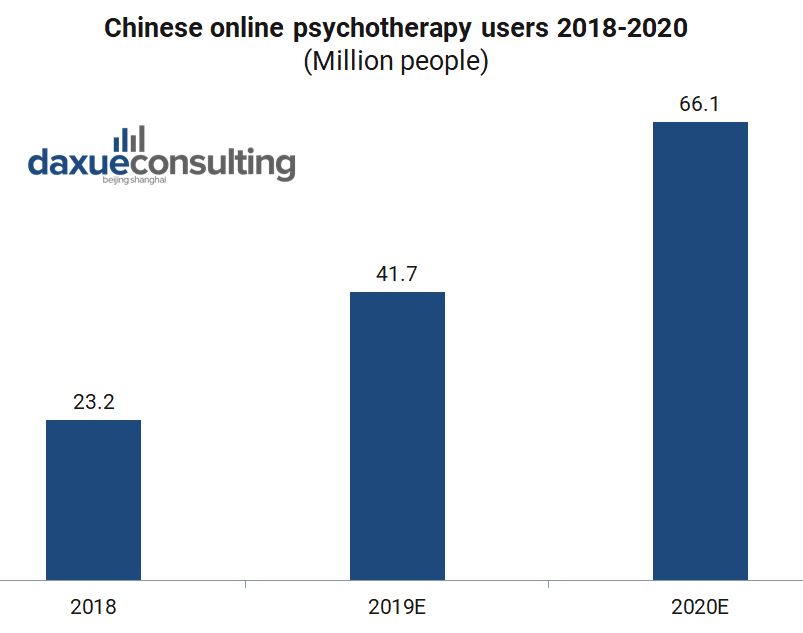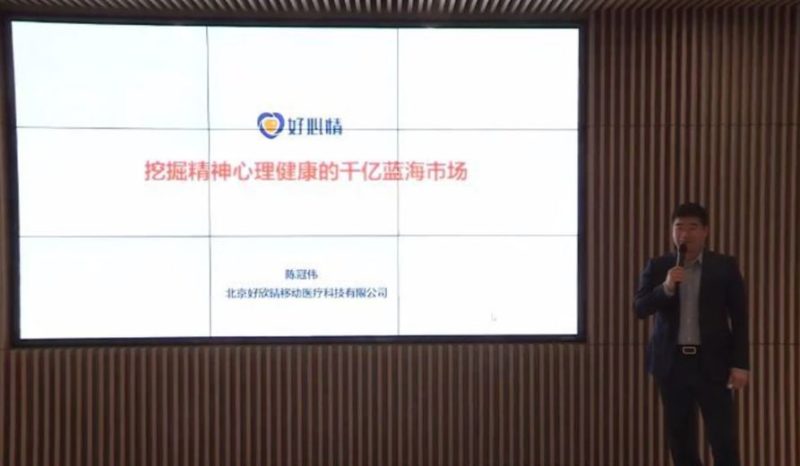The mental health market in China awakens through digital channels
While China’s rapid economic development improves the living quality, there are also concerns of worsening mental health in the context of fast-paced life. As a nation that is still recovering from taboos around the topic, the supply does not meet the demand in the mental health care market in China.
According to White paper on mental health of Urban Residents in China, among 1.1 million people in the sample, nearly 75% suffer suboptimal levels of mental health while only 10.3% enjoy a healthy mental status. The paper also indicates that there is a relationship between the mental health and physical health. 50.1% of people who have physical health also suffer mental health problems. Specifically, people who are diagnosed with tumours, diabetes and hypertension are more likely to have anxiety and depression.
A more recent survey by Teenager newspaper reported that in 2018, more than a third of the young adult in the age group 14-35 were at risk for depression and 10% had severe depression. The rate of young adults with no mental health issues dropped by 5.3% between 2008 and 2018. The risk of mild-to-moderate depression increased 5% (compare to 2008) and the risk of severe depression was also higher than in 2008. All the evidence points out the fact that more and more people in China are facing mental health problems. Additionally, the Chinese government announced a series of documents (Health China movement健康中国行动) to urge local school and institutions to pay more attention to children and teenagers’ psychological wellbeing. It is therefore important to understand the current development of China’s mental health care market and how it is organised.
Mental health care market in China: The growth of C2C psychotherapy online platforms
According to iiMedia research, the scale of e-commerce users of therapist services in China exceeded 20 million in 2018, and it is expected to triple in 2020. Rather than offline services, Chinese tend to choose online therapist services as it is more convenient and private. There are a large number of consumers needing a therapist for emotional setbacks as well as depression. This research suggests that with the development of user education the growth of the e-commerce market for therapist services will slow down in the next few years, and the services will refine themselves with more diversified segments.

Data source: iiMedia, Chinese go online for therapy sessions
Song Guo Qing Su (SGQS松果倾诉) and Hao Xin Qing (HXQ 好心情) are the e-commerce psychotherapy platforms that are trending. Both SGQS and HXQ use a C2C business model to deliver their service. SGQS attracts many independent yet less qualified therapists to join the platform. A client can choose either to communicate via text or a call and the therapists will charge accordingly. The price is in a wide range and usually much cheaper than the professional therapist in the hospital. However, SGQS does not guarantee the quality of the therapists. The same kind services are proposed on Tao Bao (淘宝) as well.
In contrast, HXQ is relatively more professional in terms of quality of therapists. According to HXQ website, the therapists registered with HXQ are all from public hospital psychiatry, neurology and psychology department doctors. Almost 20 thousand psychiatrists, accounting for 80% of the psychiatrists nation-wide, are registered with HXQ. HXQ uses the cloud and big data technology that share the sources with the supply chain of the medical and health products. Hence, HXQ is not only a provider of psychological consulting services but also a health supplement retailer.

Image source: Sohu new report, CEO of HXQ’s presentation about online mental healthcare market in China
Supply in the the mental health care market in China
In a China Paradigms interview, Zhang Ying Fei, a psychological therapist in China points out that the Chinese mental health market is underdeveloped. Even though many people want to become a therapist and some of them do obtain a certificate, low future income and high upfront investment are obstacles. In order to get the certificate, aspiring therapists need to invest time and money for training, which normally lasts six months to one year.
Independent therapists face unstable income and high investment in training
The supply of therapists in China is short partly due to the sacrifices that therapists must make. According to Zhang, “Even if someone has the certificate they are not going to be a therapist. Who can really be a therapist; according to what I observed are those that are really determined and so they have to sacrifice many things; their time, their current job”
See our China Paradigms episode with Zhang Ying Fei
Zhang says the length of the training is not enough to train people professionally. Therefore, extra investment of time and money is needed for more professionalism. This normally takes a few years and the student needs to be financially independent to do so. The low income is another obstacle, being an independent therapist in China does not guarantee a high income. It is quite the contrary, most of the people take this profession as a part-time job because of the low income and unstable consumer leads. The pay is around 200 to 300 yuan per hour which is a relatively low return on the prior investment. Additionally, there is time needed to manage the clients.. To summarize, there are four obstacles to become an independent therapist: high investment in time and money for training; low future income; unstable consumer leads and difficulty of self-managing clients.
Opportunities and challenges in mental health care market in China
Data driven technology to improve the service
Mr Chen, the CEO of Hao Xin Qing (HXQ) says the next step of HXQ is to strengthen the online systems and attract more registered doctors to join the platform. Due to the relatively conservative Chinese society which possesses a stigma against mental disorders, in combination with expensive consulting fees, Chinese people with mental sub-health are often not willing to seek professional help.
According to 2019 white paper on Mental and Psychological, 92% of Chinese who suffer mental health problems never receive any treatment. Problem such as depression and anxiety are often ignored. Some of them even refuse to admit they have mental problems. Providing an online platform protect patients’ privacy and reduce the cost for both sides. The white paper indicates that indirect mental treatment via online platforms costs an average of 350 Yuan while the direct treatment via off-line hospital costs 1,032 Yuan. Around 50% reduction on cost via online platforms. In the future, HXQ will consider introducing the offline services for their patients if there is need for rehabilitative treatment.
Future market entrants will have to discuss the growing challenges. First, the therapist’s certificate in China is easy to obtain. This reduces the quality of the therapists and increases the complaints from the consumers. This lack of regulatory policies in the mental health market makes it difficult for people with complaints to report. Secondly, there is no standard fee in the industry. Companies charge differently, raising concerns about the quality of the service as well as barrier of client trust. Therefore, regulations are necessary for the future to guarantee the growth of the mental health market in China.
How did COVID-19 effect the mental health of Chinese people?
Listen to our Daxue Talks episode with David Ammerschlaeger















